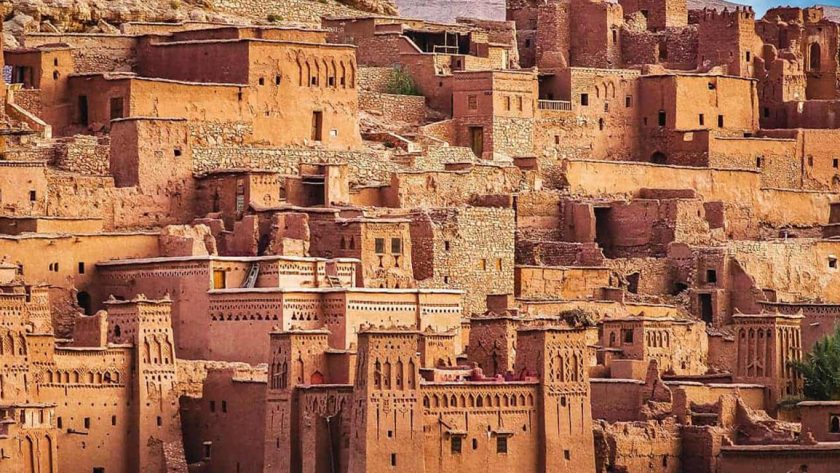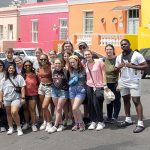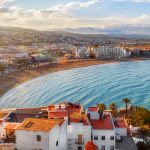The Moroccans said it was not my choice to study Arabic, it was my destiny. Just as destiny provoked my dad to call to my mom from his hotel window in Agadir, Morocco, almost 40 years ago, I was to be named Medina after the Moroccan medieval cities of my parents’ inspiration and to eventually study Arabic in Morocco, the birthplace of my family and of my name.
I first visited Morocco on a day trip from Spain four years ago. Since then I had been searching for something that would take me back to Morocco; that something turned out to be Arabic. What better way is there to experience a culture than by learning its language? Before I went to Morocco I studied Arabic at Montana State University Bozeman for a year. This proved to be invaluable on my arrival in Morocco, as the second language there is French, of which I can barely say oui. However, the Arabic world is vast and varied, including its language. I chose to study Modern Standard Arabic (MSA), the Arabic of the Quran and the most widely spread. All native Arabic speakers from Morocco to Indonesia can speak MSA, but today it is the language of the media and mainly seen in books and newspapers and heard on the news, leaving local dialects for conversation. Colloquial Moroccan Arabic (CMA), darijja to locals, is the spoken dialect of Morocco. Speaking MSA to a Moroccan is like to speaking Elizabethan English to an American in New York City.
FROM THE MEDINA TO MY HOMEWORK
Choosing a school was a no-brainer because there are only two options for studying Arabic as an English speaker in Morocco: the American Language Institute in Fez (ALIF) or Al-Akhawayn University (AUI) in Ifrane. Because I was not interested in pursuing another college degree, I chose ALIF. But, for students currently in college, AUI may be more beneficial because the class is less intensive and students have the option of taking other classes that may be transferred to their home university and credited to their degree. Montana State University is AUI’s sister university in the States and offers an exchange program with them. Both MSU’s Website, www.montana.edu, and AUI’s Website, www.alakhawayn.ma, have all the necessary info for getting enrolled in one of their programs. My classes at ALIF were arranged through www.LanguagesAbroad.com. It’s a Canadian organization that takes care of all the details from registration to housing and airport pickup at a supplemental cost. After arriving, I discovered other students had registered directly through ALIF’s Website, which offers the same services as Languages Abroad – I had paid about a third more than them.
There is no more inspirational Moroccan city for studying Arabic than Fez. The medina of Fez, a UNESCO World Heritage Site, was founded in the ninth century A.D. and is one of the few inhabited and intact medieval cities in the world. The walls of the medina enclose a sensual maze consisting of over 9,000 narrow streets and alleys, all of which are too small for any motorized transportation. Behind the nondescript streets teeming with donkeys, children, and Fassis (the people of Fez) are Morocco’s most prestigious medersas, or religious schools, and mosques dating from the city’s inception. Next to the medina are the street-side cafés and wide boulevards of the Ville Nouvelle, built by the French in the early 1900’s during their occupation of Morocco. ALIF is located in a residential neighborhood of the Villa Nouvelle in a Moorish-style villa surrounded by a lush garden of date palms and olive trees.
ALIF offers classes in MSA and CMA, with the majority of students studying the universal MSA. Group and private classes range from the standard three weeks up to two years, all depending on your needs. The school is extremely flexible and willing to tailor private classes. I was thankful for having traveled for five weeks beforehand. Due to the intensive nature of the school, combined with the fact that I was placed ahead because there were no other students at my level, it would have been nearly impossible to travel and keep up with studying; we had two other students in my class, two teachers, 20 classroom hours per week, and about four hours of daily homework. The teachers at ALIF are well educated and serious about the language; from the get-go we were notified that no English would be spoken in class. We focused on everything from grammar to conversation to the history of the Arabic world and translating newspapers.
AND THEN, RAMADAN STARTED…
I had always heard that you learn more living with a host family, and I arrived in Fez excited about the opportunity. Then Ramadan started. I knew I would be in Fez during the lunar month of fasting for Muslims, but the true impact of this did not hit me until it began. From sunrise until sunset, Muslims must abstain from all sensually satisfying actions, including eating, drinking, listening to music, having sex, and wearing perfume. Moroccans are legally and morally required to practice Ramadan. Thankfully, Westerners are exempted, but its effect on daily life is still overwhelming. So why not stay with a family during Ramadan? It would be the ultimate cultural experience and the only way to truly immerse yourself in the language, right?
I quickly realized the nocturnal schedule with a family was not going to be conducive to learning so I opted to stay in the ALIF villa. The villa, also surrounded by a beautiful garden, is across the street from the school, with private or shared bedrooms and shared living, kitchen, and bath facilities. Many of the students living at the villa were Muslims from other countries, in Morocco learning the language of their religion, so I was still able to learn about and participate in Ramadan, and practice Arabic with the nearby refuge of my own room. During Ramadan it is considered extremely disrespectful to eat or drink in front of an individual who is fasting, making it difficult to eat the amount of food I was used to. Often I would escape to the bathroom during class and scarf down a Snickers bar and some water to fend off the oncoming low-blood-sugar attack, only to return laden with guilt upon seeing my hungry classmates and teacher.
BARGAINING AND BATHHOUSES
Studying in Fez, the religious capital of Morocco, during Ramadan was a unique way to experience one of the major customs of Islam as well as an opportunity to experience what it feels like to be a minority. Not only am I non-Muslim, but also a blonde-haired, blue-eyed, female and foreign. People such as myself are a rare sight in Morocco, and when alone should be prepared for verbal harassment from young men as they follow you down the street. “Mademoiselle, Mademoiselle have you been eating today? Aren’t you practicing Ramadan?” or “Hello, open your eyes, beautiful. Can’t you see us?” This is one of the many instances where being able to speak Arabic was an invaluable tool, gaining me a bit of respect, whereas responding in French or English would only have intensified the situation.
Practicing Arabic outside of class aided my lessons. Some students chose to spend their free time traveling with the school to other areas of interest in Morocco. Others frequented places used by the locals, such as the hammam, or public bathhouse, where locals go a couple of times a week since they do not have hot water at home. Since I had already traveled around Morocco, I preferred spending the time wandering around the medina attempting to communicate with locals and soaking in as much of Fez’s culture as possible. Perhaps the most worthwhile use of Arabic on the street is bargaining. Bargaining in Morocco is used to negotiate the cost of everything from taxis, hotel rooms, and fruit to clothing and even the use of a pubic bathroom. This can be extremely annoying but with a light-hearted approach and a solid grasp of Arabic numbers under your belt, you will enjoy your stay in Morocco much more, able to rest easy at night knowing that you weren’t had every time you opened your wallet that day.
Studying in Morocco was a cultural challenge and a sensual feast. Now that I am home I am once again searching for something that will take me back to Morocco. I think that something is still Arabic.
LOWDOWN
CONTACT: American Language Institute in Fez, PO Box 2136, Fez, Morocco 30000; (212/55) 624850; alifez@iam.net.ma; www.alif-fes.com.
COSTS: Working directly with ALIF there’s an application fee of $50, and a three-week course costs 4,900 Dhs (approximately $500; course materials not included, discounts for longer study). Staying at the ALIF residence in double rooms with shared bath and kitchen runs 65 to 165 Dhs per night, comparable to a homestay within walking distance of ALIF (single shared room: 595 Dhs/week, including food.) ALIF accepts some U.S. government and other scholarship funds. Credits must be negotiated through the home institution prior to study at ALIF. ALIF maintains an overseas study partnership with the University of Florida at Gainesville.



